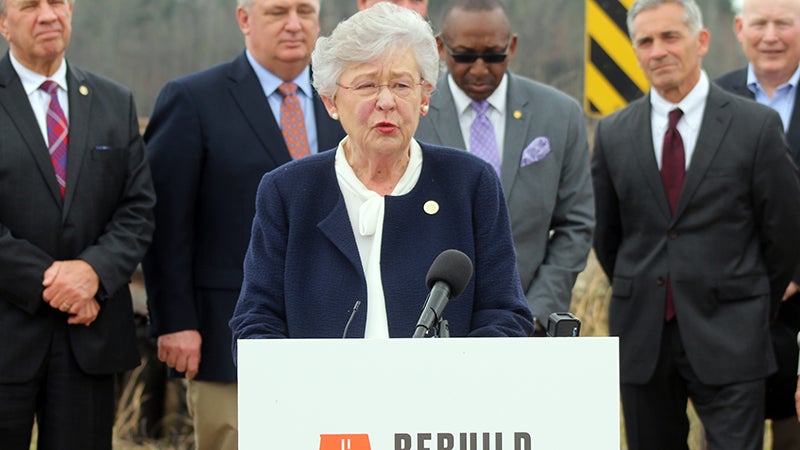Ivey signs off on bill, first increase in September
Published 5:00 pm Wednesday, March 13, 2019
After the Alabama Senate passed Gov. Kay Ivey’s “Rebuild Alabama Act” Tuesday, effectively bringing to an end the legislature’s five-day special session, the governor signed the bill into law that evening and residents will begin seeing the results by September.
Among other things, the bill provides for a 10-cent increase in gas taxes over the next three years, with the first increase of 6 cents taking effect Sept. 1 – the tax will increase by an additional 2 cents in October of 2020 and 2021 and will then be indexed to the price of construction.
The bill, HB2, sponsored by Rep. Bill Poole, R-Tuscaloosa, will also impose an additional $200 registration fee for all electric vehicles and a $100 fee on all hybrid vehicles, both of which will be increased by $3 every four years beginning in July of 2023.
The new registration fees take effect Jan. 1, 2020.
The first $150 collected from electric vehicle, as well as the first $75 collected from hybrid vehicles, will be distributed as follows: 66.67 percent will go to the state, 25 percent will go to counties and 8.33 percent will go to cities.
The remainder will be contributed to the Rebuild Alabama Fund.
Some media outlets have reported that there would be an additional registration fee imposed on passenger vehicles and motorcycles, but those fees are already in place and show up in the new bill because it is essentially a revision of a previous bill.
“Today is truly a historic day for AL,” Ivey said in a Twitter post Tuesday. “By passing the Rebuild Alabama Act, the Legislature has ensured AL’s infrastructure will be improved for generations to come. This wasn’t an easy task, but the men & women of the Legislature boldly came together to fix a decades old problem.”
The bill passed the Senate with a 28-6 vote Tuesday and cleared the House last week by a margin of 84-20, indicating widespread support for the measure – both of Selma’s legislators, Rep. Prince Chestnut and Sen. Malika Sanders-Fortier, voted in favor of the bill.
“I think everybody knows that we need money for infrastructure,” Sanders-Fortier said. “There was no argument on that. I think everybody was pretty clear that something needed to be done.”
Sanders-Fortier noted that she had concerns about the legislation, regarding the penalties being imposed on environmentally-friendly vehicles and the possibility that rural communities would not receive their fair share of the proceeds, but said most of those concerns were allayed during the process.
According to Sanders-Fortier, the additional cost for electric and hybrid vehicles is due to the fact that those drivers do not purchase gas but still use the state’s roads and bridges and should therefore still have to contribute to their upkeep.
Further, proceeds from the increased registration fee will be used to establish electric infrastructure across the state in the form of charging stations and other necessities.
Further, she said about $900,000 would be funneled into Dallas County each year as a result of the tax increase.
The state senator also said she is collaborating with other Alabama lawmakers to propose a bill that would provide a rebate to low-income families struggling to stay afloat.
While Sanders-Fortier would have preferred to funnel resources into the state via an alternate avenue, specifically the expansion of Medicaid in the state, and realizes that low-income families may suffer because of the tax hike, she stated that the need to repair the state’s crumbling infrastructure was too great to ignore.
“I think a lot of elected officials are constantly having to vote against what they think is best to get reelected,” Sanders-Fortier said. “I tried to do my due diligence in talking to the people and many people thought it was important to have safe roads and bridges. Something had to be done. I think we did what was in the best interest of all Alabamians.”
“I communicated with leadership, including the sponsor of the bill, House and Senate leaders, the governor, as well as with representatives of business, farmers, county government and corporate Alabama before making a decision,” Chestnut said of his decision to support the bill. “While I supported the bill in principle, I performed my due diligence to ensure that our area would be better for it.”
Chestnut, who had previously expressed concerns over whether the bill would effectively compensate small cities and counties, stated that under the new legislation “smaller municipalities will see a considerably higher increase than larger ones.”
Chestnut said that Orrville can expect to see a more than 500 percent increase in infrastructure funding while Selma and Valley Grande will see increases of 75 and 100 percent, respectively.
On a county level, Chestnut said Dallas County will see an increase around 43 percent, bringing its total receipts to more than $3 million, and Perry County will see a 42 percent increase, bringing its total to over $2.1 million.
“When I first announced my candidacy for elected office, I ran on the strength that I would work to improve roads and bridges,” Chestnut said. “HB2 does just that.”



